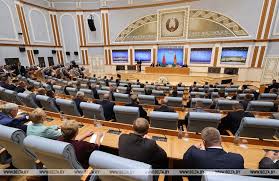Belarusian authorities and society agree on distancing from Putin’s war?

On 31 March, Larysa Sekerzhytskaya, a school teacher from the Belarusian city of Babruysk was fined for coming to work with a yellow-blue ribbon resembling a Ukrainian flag. At the same time, in March, Belarusian President Alexander Lukashenka’s regime banned one public event in support of Putin’s invasion and limited two others.
An analysis of the situation reveals Minsk’s ambiguous stance on Ukraine. This is probably due to a genuine reluctance among politicians to join in Russia’s aggression, which is paired with an overwhelming lack of support for the war among the population.
Curbing support for Putin’s invasion
Few political actors in Belarus openly support Putin’s war. The jingoism of Russian political parties in Moscow is not paralleled in Minsk. The Belarusian political forces which do are marginal. For example, Civic Accord and two other pro-Moscow groups issued a joint statement supporting Putin’s invasion in mid-March and then held a small public gathering on 17 March in Minsk.

Pro-Moscow activist Volha Bondarava. Image: rgazeta.by.
But there have been no public events like those held in Russia to acclaim the invasion—no meetings at stadiums, no auto-rallies parading “Z” symbols. On 17 March, Local officials in Hrodna, a Belarusian city on the border with Poland, prohibited a pro-Moscow activist, Volha Bondarava, from staging an auto-rally of about 20 cars in support of Belarusian and Russian “siloviki” (a term referring to senior officials in the military-security establishment). The municipal authorities told her that the roads were being repaired, so better she and her friends join other official events planned for May or July.
Another pro-Moscow activist, Mikhail Malash, said he and his fellow activists wanted to conduct their own auto-rally—with the flags of Belarus, Russia, Serbia, the Russian Empire, USSR, and DNR—to show support for the Russian military in Ukraine on 11 March. However, the Belarusian authorities—referring to an alleged request by the Russian embassy—asked them to abandon their plans. Instead, cars originally intended for the auto-rally drove their own, individual routes about Minsk, festooned with “Z” symbols made from tape and flying Serbian flags. Eventually, their individual circuits completed, the drivers came together at a specified place to record a video, addressing their “Russian brothers.” The following day, Belarusian police ordered the activists to remove all the symbols and then to send a photo of confirmation.
Pro-Russian groups face restrictions on their activities in general because none of them has official registration. On 18 March, the leaders of Immortal Regiment, a pro-Moscow movement known for exploiting the memory of WWII in the interests of the Kremlin, were refused state registration in Belarus for the fifth time. Earlier this year, the already mentioned Civic Accord also failed to get registration. Like other organisations with political inclinations but lacking in official registration, these groups can only operate within tight restrictions.
The pressure of public opinion
By adopting such policies, Minsk appears to be following the public mood. According to a Chatham House survey of public opinion, the Belarusian population in March was almost unanimously opposed to the Russian invasion of Ukraine. By contrast, similar surveys conducted in Russia show up to 80 per cent of Russians support the invasion. The results are similar whether it is the state-owned Russian Public Opinion Research Center or liberal NGO Public Opinion Foundation.

Neither Moscow nor Kyiv can be happy with the Belarusians. A Chatham House study has found that a mere 3 per cent of Belarusians support the entry of Belarusian troops into a military conflict to aid Russia. And only 1 per cent give their support if it were Ukraine. 28 per cent consider it right to “support Russia’s actions, but not enter into a military conflict,” and 15 per cent “condemn Russia’s actions without joining the conflict.” Meanwhile, 21 per cent of respondents found it difficult to answer. “Taking part in hostilities is an extremely unpopular idea, even among supporters of the Lukashenka regime,” commented Ryhor Astapienia, author of the Chatham House study.
A quarter of those polled is in favour of neutrality in this conflict, including the withdrawal of Russian troops from Belarusian territory. About the same number are willing to support Russia, but without Belarusian troops entering into a military conflict. The establishment of a Russian military base in Belarus is welcomed by only 24 per cent of respondents, with 44 per cent against the idea.
The Chatham House findings look convincing, because of the well-known anti-war sentiment Belarusians feel towards the horrendous loss of life in WWII. Indeed, this anti-war stance is showing itself in reaction to Belarusian state media, too. State media in Belarus have been repeating Moscow’s narratives. But these efforts have not resulted in any mass mobilisations of support. This is because, as Belarus Digest has reported, the Belarusian regime lost its cultural and discursive hegemony years ago.
Moscow’s influence is questionable
Russian soft power in Belarus remains limited. In February, a pro-Moscow political group Civic Accord published a policy paper on domestic Belarusian media. The paper found the influence of pro-Russian media in Belarus to be negligible. It quoted statistics from Telegram, an instant messaging platform, which is widely used in Belarus:
Among Telegram channels in Belarus, Pro-Western and nationalist media resources make up 88 per cent of total audience coverage. Pro-government media resources have 11 per cent of total audience coverage, and pro-Russian media have 1 per cent.
The list of the 50 most popular Telegram channels in Belarus includes only four pro-government outlets: the Belarusian president’s own channel, the channel “Yellow Plums” (which is apparently linked with the Belarusian police forces), the Belarusian Health Ministry, and the channel of Yuri Voskresensky, a pro-government politician.

The content of TV channels broadcast in Belarus in 2020 (red – Belarusian, blue – Russian, yellow – Ukrainian). Image: thinktanks.by.
Certainly, Russian TV channels do exert some influence over the Belarusian population, especially older people. But Belarusian authorities have long been editing them and demanding Belarusian content should make up a third of total broadcasts.
According to one unpublished study conducted by an authoritative Western organisation in 2017, less than 9 per cent of those aged 50-or-older used online communications, which makes them the main TV audience.
At the same time, this is the strength and the weakness of Putin’s propaganda. Although some Belarusian opposition activists talk about Lukashenka as a marionette of the Kremlin, or even about the occupation of Belarus by Russia, they obviously exaggerate. Political News Agency, a Russian nationalist media outlet, recently lamented:
Lukashenka vigilantly prevents the formation of a pro-Russian public or political force… there is not a single pro-Russian political party in Belarus, not a single public-political organisation, not a single pro-Russian media… [otherwise] this banned “third force” could be conducting explanatory work among the population, including those related to the special operation in Ukraine.
The regimes in Minsk and Moscow are being dealt with on different terms. The Belarusian government has its sad record of restricting freedoms, election fraud, and police violence, for which it must be held accountable by the Belarusian people. But various signs suggest the Belarusian authorities have become unwilling facilitators of Russia’s aggression, while the overwhelming majority of the Belarusian people oppose Putin’s invasion and plans for domination. In this light, the differing views and behaviour of the Belarusian authorities and the citizens of Belarus in response to Russia’s war in Ukraine make sense.







